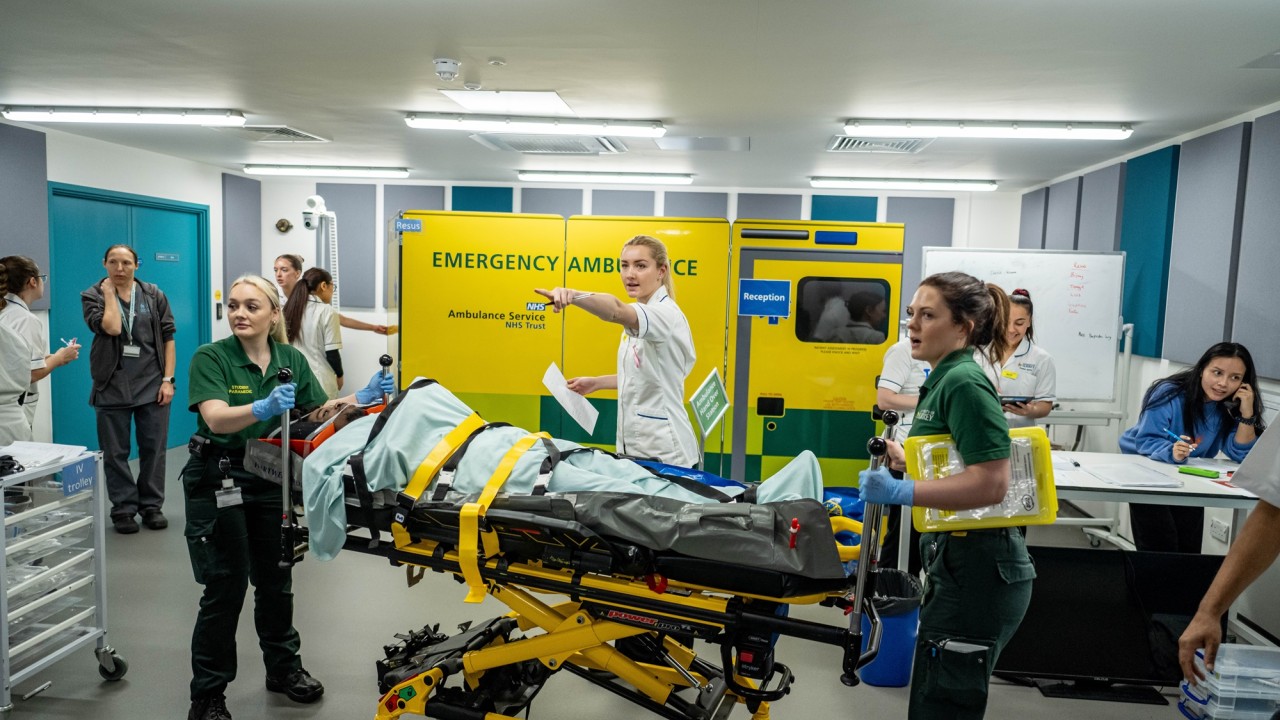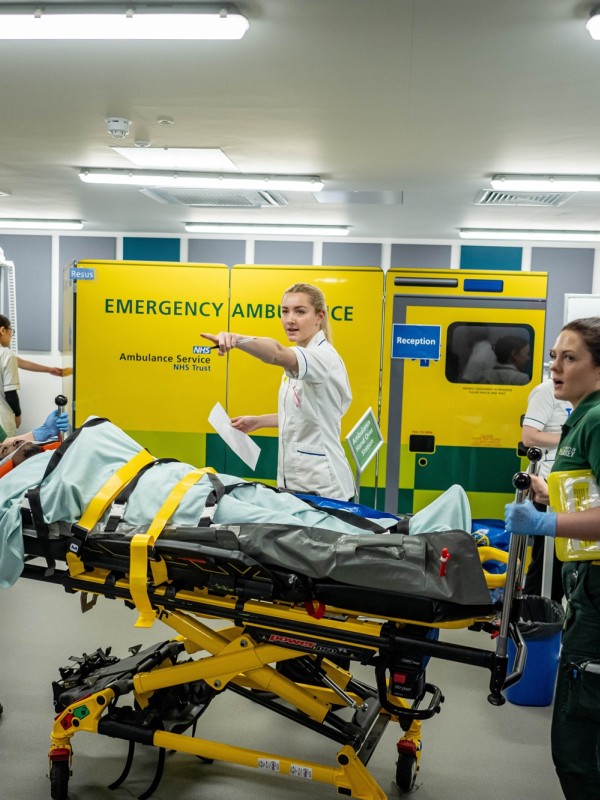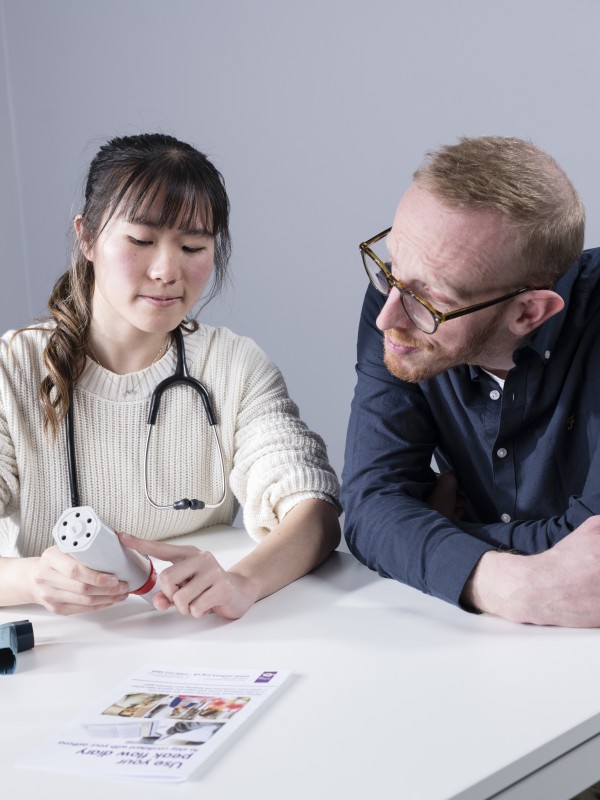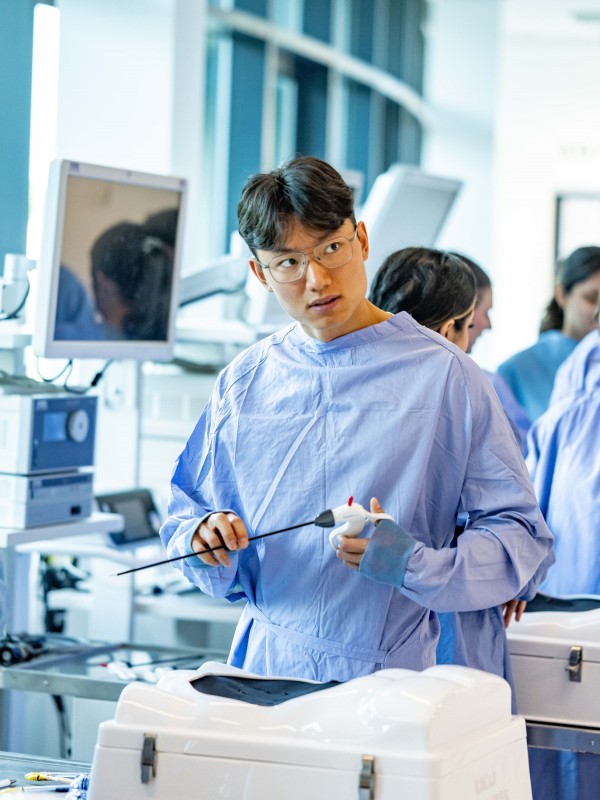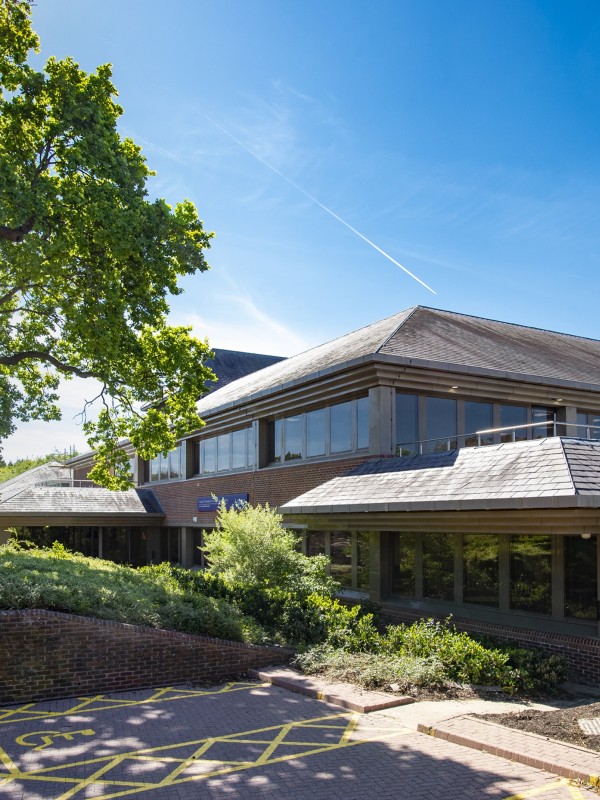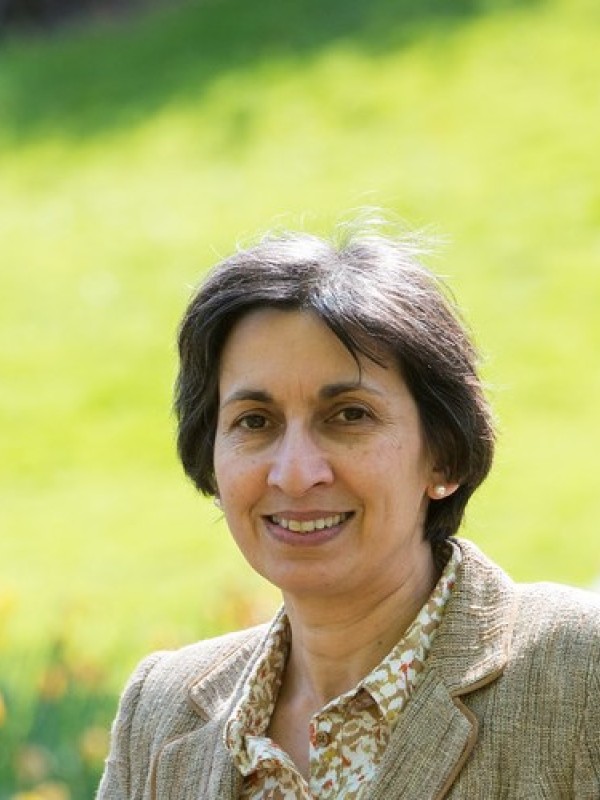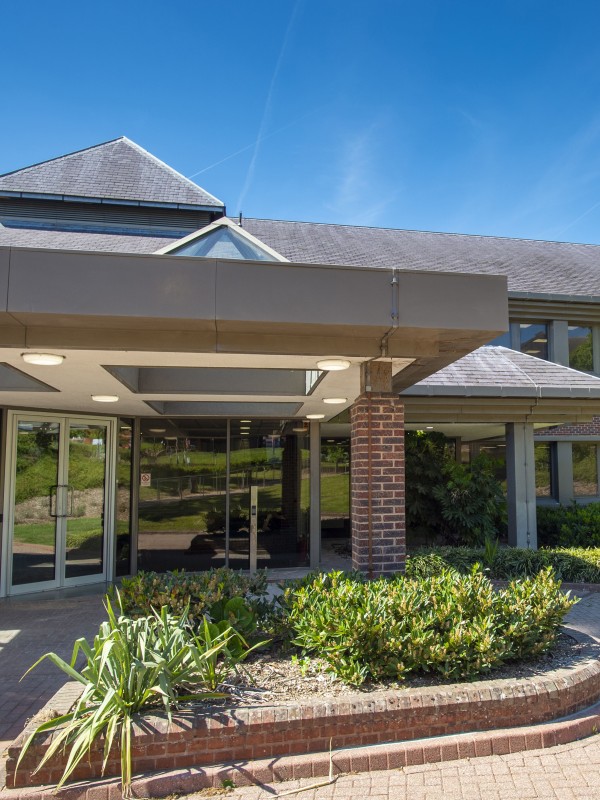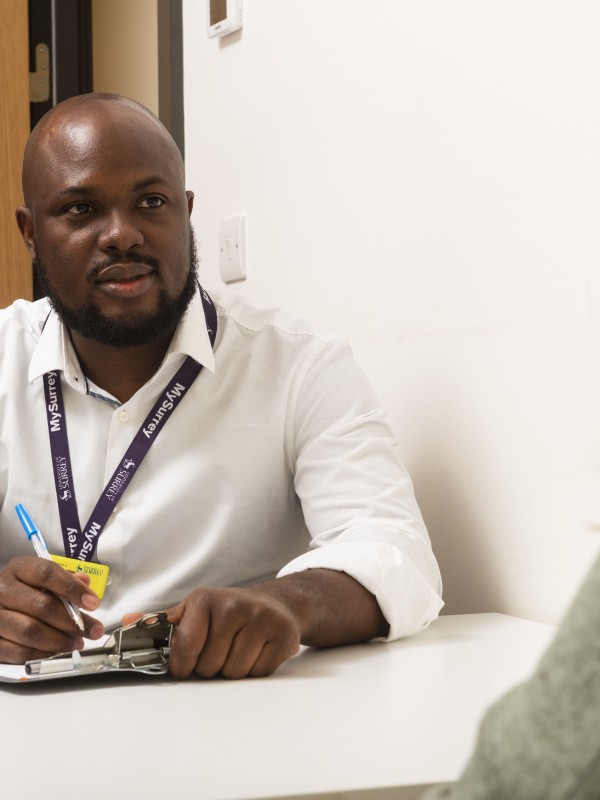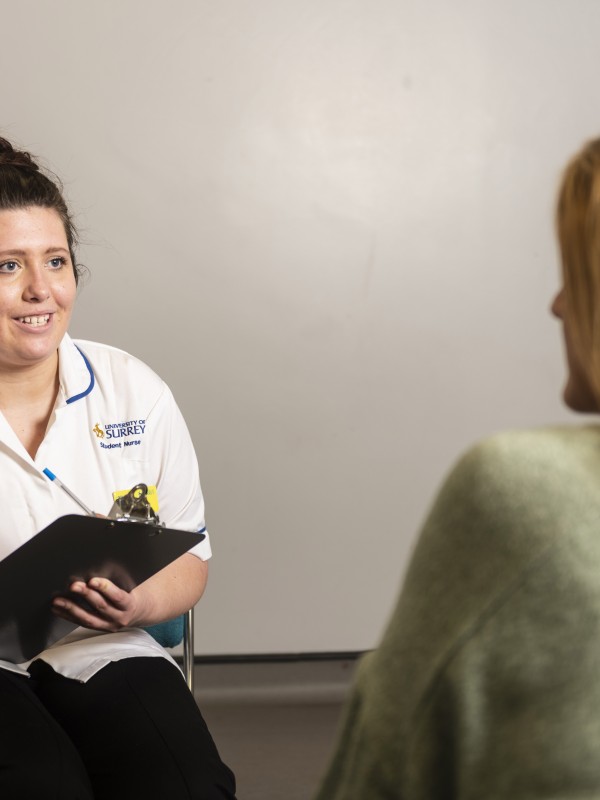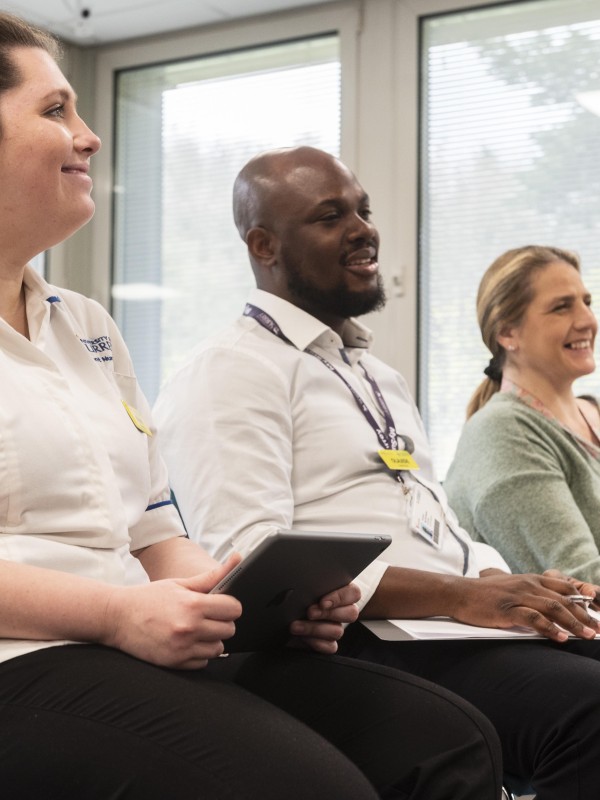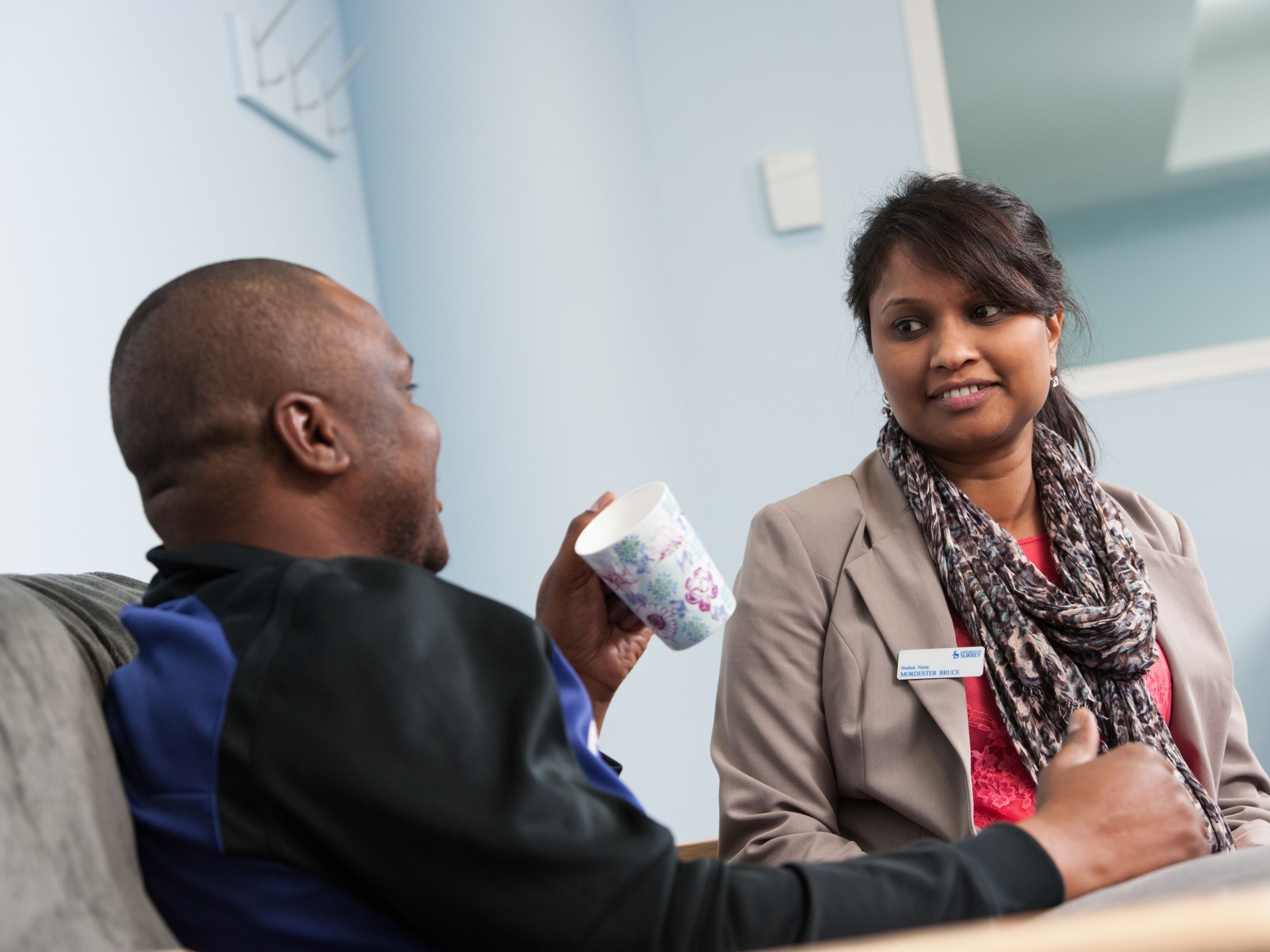
- Physician Associate Studies
PGDip — 2026 entry Physician Associate Studies
On our Physician Associate Studies PGDip, you’ll develop the well-rounded knowledge that modern healthcare practice requires and employers search for. You’ll leave Surrey with the skills you need to make an impact in this exciting and important position in the NHS.
4,138+ people have created a bespoke digital prospectus
Why choose
this course?
- Spend half of your training in clinical placements, to practise your skills in primary and secondary care settings, under the supervision of qualified practitioners.
- Access our state-of-the-art Clinical Simulation Centre, including two wards and an Immersive Learning Environment, and our Centre for Anatomical and Surgical Education (CASE), where you’ll be taught anatomy using cadaveric prosections.
- Learn from lecturers with international recognition for their expertise in medicine, who are all healthcare professionals currently working in the NHS, including registered physician associates.
- Benefit from hands-on, interprofessional learning in our annual real-time simulation event in your second year, where you’ll work alongside our health sciences students to deal with lifelike scenarios in a mock NHS hospital.
- Get the academic requirements needed to complete the Physician Associate Registration Assessment (PARA) and register with the General Medical Council (GMC) to practise clinically once you’ve graduated.
All physician associate students (home and overseas) will receive a training grant provided by NHS England of £5,202, split between the two years of the course (£2,601 per year). You do not need to apply for this grant – once funding is confirmed by NHS England, it will be automatically allocated to all students registered and in attendance on the course.
Statistics
92%
Of our postgraduate health sciences graduates are in employment or further study within 15 months of graduating (Graduate Outcomes 2025, HESA)
Accreditation
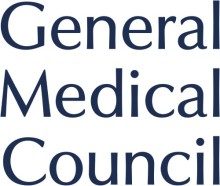
What you will study
On our Physician Associate Studies course, you’ll learn to support doctors (based in GP surgeries and hospitals) with taking medical histories, performing examinations, diagnosing illnesses, analysing test results and developing management plans.
We’ll give you the skills you need to assess, diagnose and manage various medical problems as a self-assured, confident healthcare professional. Spending time with an experienced senior doctor, whether working under supervision or alongside your mentor, you'll assist patients who present with numerous different conditions.
Professional recognition
PGDip - General Medical Council (GMC)
Regulated by the General Medical Council (GMC)
The structure of our programmes follows clear educational aims that are tailored to each programme. These are all outlined in the programme specifications which include further details such as the learning outcomes:
Modules
Modules listed are indicative, reflecting the information available at the time of publication. Modules are subject to teaching availability, student demand and/or class size caps.
The University operates a credit framework for all taught programmes based on a 15-credit tariff, meaning all modules are comprised of multiples of 15 credits.
Course options
Year 1
Semester 1
Core
Students will receive a basic introduction to learning clinical medicine, with and individual student needs assessment, and induction to the University and its student support services. They will then start the case based learning section of Year 1, undertaking the first three cases.
View full module detailsStudents will be working through Cases 4-8 of the Case sequence that makes up Year 1, covering common respiratory, paediatric and ENT presentations of illness
View full module detailsSemester 2
Core
Students will be working through Cases 9 -13 of the case sequence that makes up Year 1, covering common gastroenterology, urology, gynaecology and neurology including visual system and stroke, dermatology, presentations of illness (dyspepsia, abdominal pain, urinary tract infections, abnormal vaginal bleeding, and epilepsy).
View full module detailsStudents will be working through the final cases in the sequence that makes up Year 1, covering mental health, endocrinology and cancer presentations of illness. In addition they will study a more complex case in an elderly patient with multiple morbidity. The module finishes with a consolidation week prior to semester 2 assessments, which looks back across all four modules' cases and prepares students for the OSCE. In the final four weeks of the year, students will have their first experience of secondary care in the specialties of frailty and mental health, in both hospital and community settings.
View full module detailsYear 2
Semester 2
Core
You will be on clinical placements in general practice for the GP attachment. You will be at one of the partner Trust hospitals for the elective period of four weeks, which is an opportunity for you to select a clinical medical specialty of your own choice. During your clinical placements, you will also spend one day in every three weeks in consolidation/ clinical skills learning back in the University. During this time, you will learn and practice the core clinical procedural skills and continue with case based learning.
View full module detailsSemester 1 & 2
Core
Following a preparatory week, you will be spending clinical placement time at our Trust partner hospitals rotating through the clinical disciplines of Obstetrics and Gynaecology, Paediatrics, Psychiatry, Emergency Care, General Medicine and Surgery. During your clinical placements, students will also spend one day in every three weeks in consolidation/ clinical skills learning back at the University. The module will include a Reading week
View full module detailsTeaching and learning
You’ll be taught by a multidisciplinary team of lecturers who are all healthcare professionals currently working in the NHS. Many are also active researchers, investigating topics such as cancer, dementia, ethics and compassionate practice. These may include Roz Clegg, who’s been a qualified physician associate for over 10 years, and Sam Voller, a Surrey alumnus and qualified physician associate working in respiratory medicine.
You’ll also be taught by guest lecturers who are consultants from the Royal Surrey County Hospital and Frimley Park Hospital.
When you join, you’ll be assigned a second-year physician associate student as part of our buddy system. They have first-hand knowledge of clinical placements and assessments and can give you vital feedback and support throughout your studies.
Throughout your placements, you'll have an educational supervisor, who’s a senior clinician. They'll guide you through your experience and feed into your evidence portfolio.
Day-to-day learning
Your teaching will be delivered through a combination of:
- Group work (e.g. discussion groups)
- Lectures
- Online learning
- Practical simulation classes and clinical skills scenarios
- Role plays
- Seminars
- Tutorials.
Outside of these, you’ll be expected to carry out independent study, including coursework, essays and reading.
For some modules, you’ll learn alongside students from other health sciences courses, so you can develop an understanding of inter-professional teamwork.
When you're on placement
Your teaching will be delivered through a combination of:
- Demonstration
- Discussion groups
- Observation
- Practice under supervision
- Reflective dialogue
- Role modelling
- Shadowing.
Assessment
We use a variety of methods to assess you, including case studies, examinations, presentations, simulated learning experiences (objective structured clinical examinations – OSCEs, mapped against the criteria used in the National Assessment for Physician Associates, which you’ll take once you graduate) and written work. When you’re out on placement, your knowledge, skills and professional behaviour will be assessed by your mentors.
Check individual module information to see full details at a module level.
General course information
Contact hours
Contact hours can vary across our modules. Full details of the contact hours for each module are available from the University of Surrey's module catalogue. See the modules section for more information.
Timetable
Students in year 1 will receive a bespoke timetable in advance of each two-week case-based Learning block.
Scheduled teaching can take place on any day of the week (Monday – Friday).
Location
Our medicine, paramedic science, nursing and midwifery, and CPD health sciences courses are taught at the Kate Granger Building (30 Priestley Road) on the Surrey Research Park.
We offer careers information, advice and guidance to all students whilst studying with us, which is extended to our alumni for three years after leaving the University.
On successful completion of this course, you can take the Physician Associate Registration Assessment (PARA). Once you’ve passed this, you’ll be able to practise clinically in the UK.
All our alumni have gone on to work as physician associates in primary and secondary care settings, specialising in areas including acute medicine, emergency healthcare and neurology.
Career prospects
Physician associates currently work in over 40 specialities across GP practices, hospitals, and community care, and provide crucial support in the delivery of medical services across the healthcare system.
While working in collaboration with our partners, we’ll help transform you into a physician associate who can make their mark in both primary and secondary care.
Discover more about the role of a physician associate on the NHS careers website.
You’ll benefit from our multimillion-pound facilities, home to our Clinical Simulation Centre, which includes two wards, a critical care unit, and a community flat. You’ll get to use equipment found in the NHS to learn how to fit cannulas, check for heart murmurs, monitor breathing and much more. You'll practise your skills with lifelike manikins and in scenarios with actors to give you a taste of what you may face during your training and when you’re fully qualified.
You’ll get exclusive access to our Independent Clinical Learning Space. The room is set up each week with the necessary equipment required to practise the techniques you’ll be learning. When you're on clinical placement, you can use your Trust’s facilities, which may include simulation suites.
You'll also be taught anatomy in our new Centre for Anatomical and Surgical Education (CASE), which is part of our School of Medicine.


Daud
Student - Physician Associate Studies PGDip
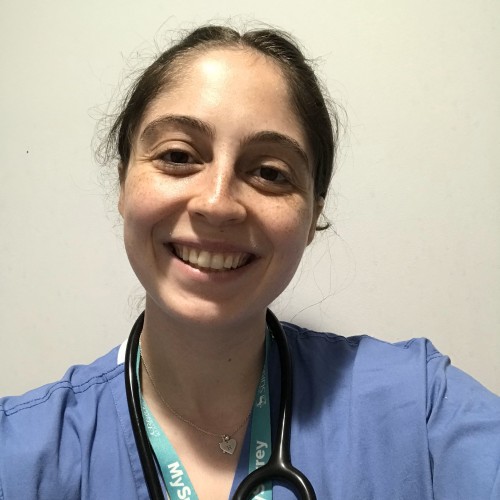
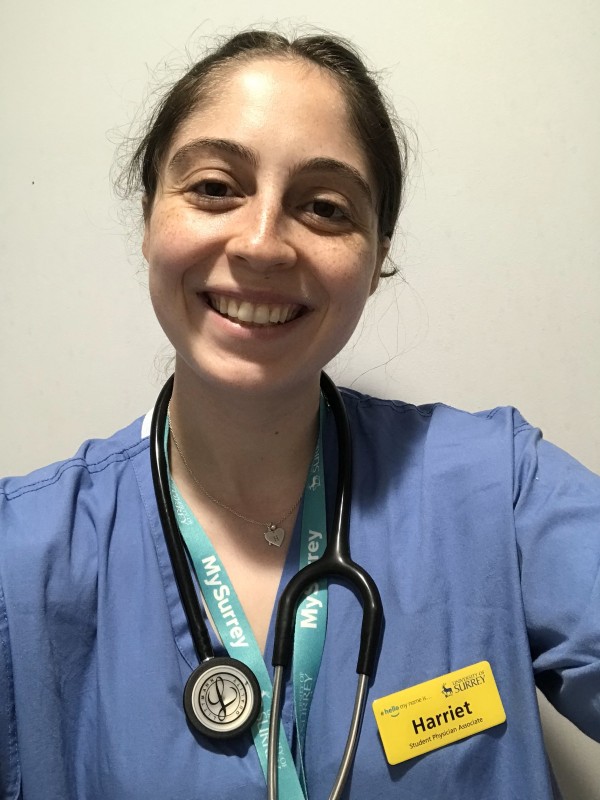
Harriet
Graduate - Physician Associate Studies PGDip
UK qualifications
A minimum of a 2:2 UK honours degree in anatomical sciences, biochemistry, biomedical science, biomedicine, human biology, medicinal chemistry, microbiology, neuroscience, nursing (adult, child, mental health), paramedic science, pharmaceutical science, or physiology, or a recognised equivalent international qualification.
We will consider the following degrees: biological sciences, biology, health psychology, pharmacy, psychology, sport and exercise science or veterinary medicine. We'll also consider relevant work experience.
GCSE English and Maths C (or equivalent) are also required.
Applicants who have started or completed medicine degrees are not accepted (Bachelor of Medicine, Bachelor of Surgery, MBBS).
Other entry requirements
Admission to this programme is subject to the Rehabilitation of Offenders Act (1974) Section 4 (2) (Exemptions) Order 1975 and DHSS Circular HC(88)9 guidelines regarding police checks and child protection.
Offers are conditional upon satisfactory health and fitness for practice screening, references and Disclosure and Barring Service (DBS) clearance, or equivalent.
This is a regulated course that requires declaration of criminal convictions at the application stage, please visit our criminal convictions webpage for more information.
Candidates must also meet national requirements to work with vulnerable adults and children.
Applicants must be immunised against Hepatitis B before registering on the course.
English language requirements
IELTS Academic: 7.0 overall with 7.0 in each element.
These are the English language qualifications and levels that we can accept.
If you do not currently meet the level required for your programme, we offer intensive pre-sessional English language courses, designed to take you to the level of English ability and skill required for your studies here.
Selection process
Shortlisting
Admissions staff will review the information provided within the personal statement and reference to assess applications for evidence of academic ability, insight and motivation. Personal statements should be comprehensive, with correct spelling, grammar and punctuation. Shortlisted applicants will be invited to an online interview.
Interviews
Applicants successful at the shortlisting stage will be required to attend an online interview conducted by University academics, assisted by staff from clinical practice areas. Applicants selected to attend one of our interview days will be sent detailed guidance on the interview with their invitation. Interviews will be conducted in the format of multiple mini interviews (MMIs).
Deferred entry
The course does not accept applications for deferred entry.
Covid-19 vaccinations
On 15 March 2022, regulations revoking the Vaccination as a Condition of Deployment (VCOD) for Healthcare Workers came into force. This means that it will not become a requirement for people to have received a Covid-19 vaccine in order to deliver face-to-face CQC-regulated activities in wider social care settings. Whilst we still encourage everyone to get vaccinated where they can, it is no longer a requirement for this programme.
Recognition of prior learning
We recognise that many students enter their course with valuable knowledge and skills developed through a range of ways.
If this applies to you, the recognition of prior learning process may mean you can join a course without the formal entry requirements, or at a point appropriate to your previous learning and experience.
There are restrictions for some courses and fees may be payable for certain claims. Please contact the Admissions team with any queries.
Placements
Clinical placements
In your first year, you’ll spend one day a week in a clinical placement within a primary care setting, at a doctors’ surgery in Surrey or Sussex. The remaining four days will consist of classroom teaching, including using our simulation facilities. In your second year, you’ll spend most of your time in a secondary care setting in hospitals across Surrey and Hampshire, returning to Surrey for a full day of teaching every three weeks.
You’ll also benefit from educational sessions available in your allocated NHS trust, giving you an opportunity to expand on your knowledge and network with healthcare professionals.
Scholarships and bursaries
Discover what scholarships and bursaries are available to support your studies.
Fees per year
Explore UKCISA’s website for more information if you are unsure whether you are a UK or overseas student. View the list of fees for all postgraduate courses.
September 2026 - Full-time - 2 years
- UK
- £12,900
- Overseas
- £25,900
- These fees apply to the academic year 2026-27 only. Fees are reviewed annually, and tuition fees may increase for courses running over more than one year.
Additional costs
Local travel expenses: Unable to specify amount - In the first year students will be expected to attend a placement at a local GP surgery one day per week. In the second year students will undertake a series of clinical placements provided by local NHS Trusts. Students will be expected to meet the travel/parking costs incurred whilst on placement.
Disclosure and Barring Service (DBS) check: The University will meet the cost of one DBS check, completed ahead of the course commencement date. The DBS check is a course requirement: it is mandatory that the DBS process is completed and the applicant is approved to attend before they can enrol onto the course. Applicants offered a place on the course will be contacted to complete the online process by the deadline specified. The process is not completed until all original documentation has been approved by an appointed DBS approver. This can be completed in advance of applicants starting their course using main branches of the Post Office, where there will be a £6 administration fee.
Exams: Following successful graduation from this Diploma course, you will need to sit the National Assessment for Physician Associates, set by the Faculty of Physician Associates at the Royal College of Physicians, London. This exam is not part of the Surrey programme and therefore not covered by your course fees. For further information please refer to the Faculty of Physician Associates website.
Funding
Please be aware: As this course is a PGDip, students will not be eligible for the Student Finance England Postgraduate Master's Loan.
How to apply
You can apply for this course through UCAS, with the programme code PA01.
The course can also be found by searching for ‘Physician Associate Studies’ on the search function of UCAS.
Admissions information
Once you apply, you can expect to hear back from us within 14 days. This might be with a decision on your application or with a request for further information.
Our code of practice for postgraduate taught admissions explains how the Admissions team considers applications and admits students. Read our postgraduate applicant guidance for more information on applying.
About the University of Surrey
Need more information?
Contact our Admissions team or talk to a current University of Surrey student online.
Terms and conditions
When you accept an offer to study at the University of Surrey, you are agreeing to follow our policies and procedures, student regulations, and terms and conditions.
We provide these terms and conditions at offer stage and are shown again at registration. You will be asked to accept these terms and conditions when you accept the offer made to you.
View our generic registration terms and conditions (PDF) for the 2025/26 academic year, as a guide on what to expect.
Disclaimer
This online prospectus has been published in advance of the academic year to which it applies.
Whilst we have done everything possible to ensure this information is accurate, some changes may happen between publishing and the start of the course.
It is important to check this website for any updates before you apply for a course with us. Read our full disclaimer.
